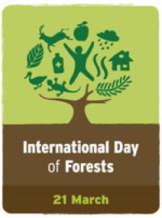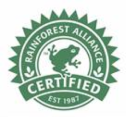 The United Nations General Assembly adopted resolution A/RES/67/200 on 21 December 2012, which declared that 21 March of each year is to be observed as the International Day of Forests. The resolution encourages all Member States to organize activities relating to all types of forests. Activities expected to take place on the International Day include tree-planting and other community-level events, and national celebrations including art, photo and film as well as social media outreach.
The United Nations General Assembly adopted resolution A/RES/67/200 on 21 December 2012, which declared that 21 March of each year is to be observed as the International Day of Forests. The resolution encourages all Member States to organize activities relating to all types of forests. Activities expected to take place on the International Day include tree-planting and other community-level events, and national celebrations including art, photo and film as well as social media outreach.
Why are forests so important?
The International Day of Forests is held annually to raise awareness of the importance of forests to people. Forests cover 31% of global land area. Forests and trees sustain and protect us, contributing to the balance of oxygen, carbon dioxide and humidity to provide clean air, providing clean water by protecting watersheds which supply 75% of freshwater worldwide, safeguarding biodiversity and acting as a buffer against climate change.
Forests are the most biodiverse ecosystems on land, home to more than 80% of the terrestrial species of animals, plants and insects, and, for more than 1.6 billion people, including more than 2,000 indigenous cultures, they also offer food, fuel, medicine, shelter, inspiration and livelihoods.
Despite all of these priceless ecological, economic, social and health benefits, we are destroying the very forests we need to survive. Global deforestation continues at an alarming rate – 13 million hectares of forest are destroyed annually – and deforestation accounts for 12 to 20 percent of the global greenhouse gas emissions that contribute to climate change.
The International Day provides a platform to communicate the vital role forests play in poverty eradication, environmental sustainability and food security. Sustainable management of all types of forests are at the heart of unlocking challenges of conflict-affected, developing and developed countries, for the benefit of current and future generations.
What can you do?
We can all take small actions which will make a difference for the fate of our forests and the services they provide us with.
1. See and share this video and spread the message to help raise awareness. Find out more about the International Day of Forests or read more about the importance of forests to our economies and societies.
2. Get down to earth by planting some native trees in your garden or community – oak and birch will support the most species of animals (over 300 species of insect and many birds and fungi) but if you have less space a smaller tree like a hawthorn will give support many species and fruit and nut trees are also valuable for wildlife (for native trees and heritage varieties check out Irish Seed Savers and Future Forests). It’s currently the wrong time of year but come autumn you could try growing your own from seed which apart from being a lot cheaper (i.e. free) as with most DIY activities it is also very rewarding. See how to raise trees and shrubs from seed.
3. There are many woodland and rainforest charities working to protect and create native forest. In Ireland, a number of charities promote planting of native woodland including Crann, the Tree Council of Ireland and the Native Woodland Trust and Just Forests which campaigns against illegal deforestation. In the UK, the Woodland Trust campaigns to preserve and expand native woodland and if you’re more interested in protecting “the Earth’s lungs” there are many rainforest charities including World Land Trust which purchase threatened rainforest in biodiversity “hotspots” of the world.
Are you eating the rainforest?
When you buy food and wood products you may unwittingly be contributing to tropical deforestation. To avoid this, when you purchase wood products look for the Forest Stewardship Council logo and for tropical products like coffee or cocoa look for the Rainforest Alliance frog. Palm oil has expansion has been the major driver of deforestation in South-East Asia and it is an ingredient, frequently labeled as ‘vegetable oil’ in up to 10% of supermarket products, from bread to party food. Look for palm oil-free/vegetable oil-free products or those made with sustainable palm oil in the following palm oil database.
Did you find this information useful? Let us know what you are thinking of doing to protect our forest?


